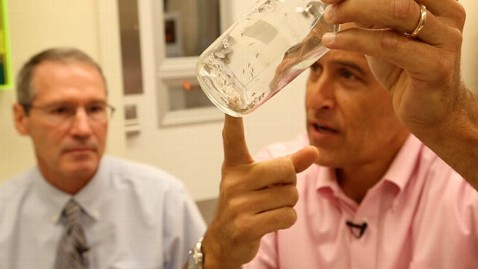West Nile Virus: Recognizing The Symptoms

Dr. Richard Besser is shown how different insecticides kill mosquitoes at the CDC's Vector Borne Disease Laboratory in Fort Collins, Colo. Credit: Jake Whitman/ABC
Dr. Lyle Petersen knows a lot about West Nile Virus. In his role as director of the group at the CDC that deals with mosquito-borne diseases, he is in charge of our nation's efforts to understand and control this virus. However, unlike most infectious disease experts, he also knows this virus personally; in 2003, Petersen became its victim.
He knew the importance of avoiding mosquito bites, especially at dawn and dusk when the females are most actively looking for blood meals. He knew that he should remove the standing water from around his house that mosquitoes loved to lay eggs in. He knew that mosquito repellant and long sleeves were the way to go for prevention. He had been telling people what to do for years.
Yet one evening, he threw caution to the wind and went down the road to fetch his mail from the mailbox without covering up or using repellant. While out, he ran into a running buddy and a two- minute trip stretched into a lot longer. Returning home, he didn't think much of the few mosquito bites he had gotten. Three days went by.
Then it hit: fever, muscle aches, headache, eye pain, stiff neck and fatigue. The fatigue was the worst of it. Petersen, a marathon runner, had trouble climbing the stairs without getting short of breath. It was a full three months before he was back to normal.
READ: Fighting the Largest West Nile Virus Outbreak in U.S. History
Here are the basics in terms of infection. Eighty percent of people who are infected will have no symptoms- none! Their bodies will fight it off without them ever knowing they were infected and they will be protected from future infection. Around 20 percent will have flu-like symptoms: fever, headache, body aches, nausea, vomiting and sometimes swollen glands. These usually last for weeks but can last much longer. Dr. Petersen told me that once he had the disease, he stopped calling it "mild."

Dr. Richard Besser inspects a mosquito trap in Fort Collins, Colo., which is empty because of neighborhood spraying. Credit: Jake Whitman/ABC
The most severe form of West Nile virus is the neurologic form. According to CDC it occurs in around 1 in 150 patients. In addition to the high fever and headache, these patients can have stiff neck, confusion, weakness, seizures, vision problems and paralysis. This is the type of disease that can be fatal.
There is no treatment for West Nile virus infection and it is not spread person-to-person. If you have flu-like symptoms, rest up, drink plenty of fluids, and take something for the fever. If you develop a severe headache, confusion, weakness or any of the other signs of neurologic disease, see your doctor right away. Although there is no treatment to kill the virus, there are supportive measures that can be provided.
This is clearly a disease where prevention is critical. Pay attention to your health department and if there is West Nile virus activity in your community, do what you can to "Fight the Bite."